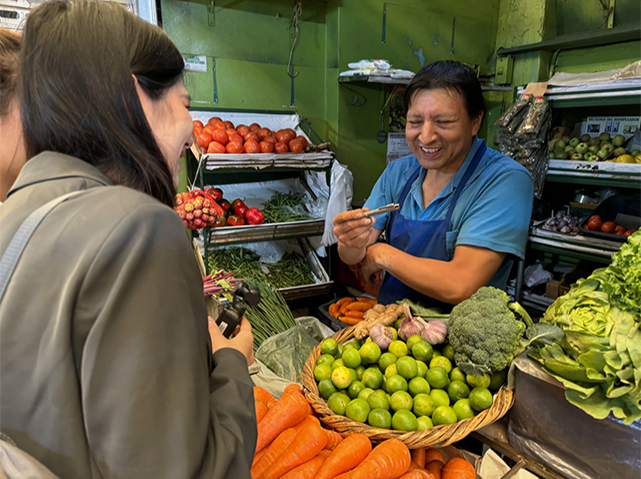Exporting to China makes more money, says vendor at a market in Lima, amid growing agricultural trade

Percy Pena Angeles, a vendor at the Mercado Lobaton market in Lima, capital of Peru, talks with reporters on November 13, 2024. (Wang Cong/GT)
As China and Peru are set to deepen bilateral ties during upcoming high-level events, Peruvian officials and agricultural businesses are seeking to further expand agricultural cooperation with China, leveraging various joint efforts to boost trade.
Agriculture has become a highlight of booming economic and trade cooperation. In interviews with the Global Times on Wednesday (local time), agricultural businesses stressed the importance of the vast Chinese market for Peruvian exports and expressed optimism for greater opportunities.
At the Mercado Lobaton, one of the largest markets in the Peruvian capital of Lima where many locals come to buy their daily groceries, the potential for greater cooperation between China and Peru in agricultural trade was on vivid display, as numerous packages of fresh vegetables and fruits were neatly put in boxes, indicating Peru's status as a major agricultural producer.
On a bustling Wednesday morning, while vendors were busy selling products to local residents, some were also evidently paying close attention to consumers across the Pacific Ocean in the Chinese market, where demand for high-quality vegetables and fruits remains strong.
"This is for export to China," Percy Pena Angeles, a vendor at the market, told the Global Times in Spanish, while pointing to a bag of blueberries. He also showed chili peppers and garlic bulbs that are exported to China.
When asked whether selling agricultural products for local consumers at the market makes more money or exporting to China makes more, Angeles raised both of his hands in a gesture of counting money and said without any hesitation: "Export!"
Angeles' great interest in the Chinese market is shared by many Peruvian farmers, according to Joseph Cruz Soriano, a distinguished Peruvian Sinologist. "Many farmers in the country want to export to China," Soriano told the Global Times in an interview.
Despite the profitable export business, Angeles also raised an issue with Peru's agricultural exports to China at the moment. "Products need to be shipped to Panama before being exported to Chinese and European markets," he said.
However, that's about to change, with the Chancay Port set to start operations soon, Angeles said, adding that he expects greater China-Peru cooperation as direct cross-Pacific shipping operations between China and Peru will make it much easier to export to China.
Built and operated by Chinese companies, the Chancay Port is a new flagship project under the Belt and Road Initiative. The use of the port will cut the transportation time of goods exported from South America to the Asian market from 35 days to 25 days.
For Peruvian agricultural exporters, the operation of the Chancay Port means their products will arrive in China faster and at a lower cost, which will significantly boost the volume.
In an interview with El Comercio, a Peruvian newspaper, on Wednesday, Angel Manero, Peru's minister of Agrarian Development and Irrigation, said that the trend is that in 20 years, China will become Peru's main agro-export market.
The South American country's agricultural exports to China could increase by 20 percent over the following years through the Port of Chancay, Manero said, according to a translation of the Spanish-language report in El Comercio.
In addition to the operation of Chancay, another major step taken by the two countries could also offer a huge boost to Peru's exports to China. In June, the two countries announced the substantive completion of negotiations on upgrading their free trade agreement (FTA).
Thanks to the FTA, which took effect in 2010, Peru's trade with China, including agricultural exports, has surged. It has become the largest supplier of blueberries and avocados to China, with products such as quinoa, grapes, maca, and alpaca wool, among others, gaining popularity in the Chinese market.
Photos
Related Stories
- China, Peru stress AI cooperation, digital inclusivity
- China, Peru to enhance cooperation on fishing
- China, Peru to deepen comprehensive strategic partnership
- China, Peru to incorporate projects in emerging areas into bilateral cooperation
- China, Peru continue to support WTO-centered multilateral trading system
Copyright © 2024 People's Daily Online. All Rights Reserved.









